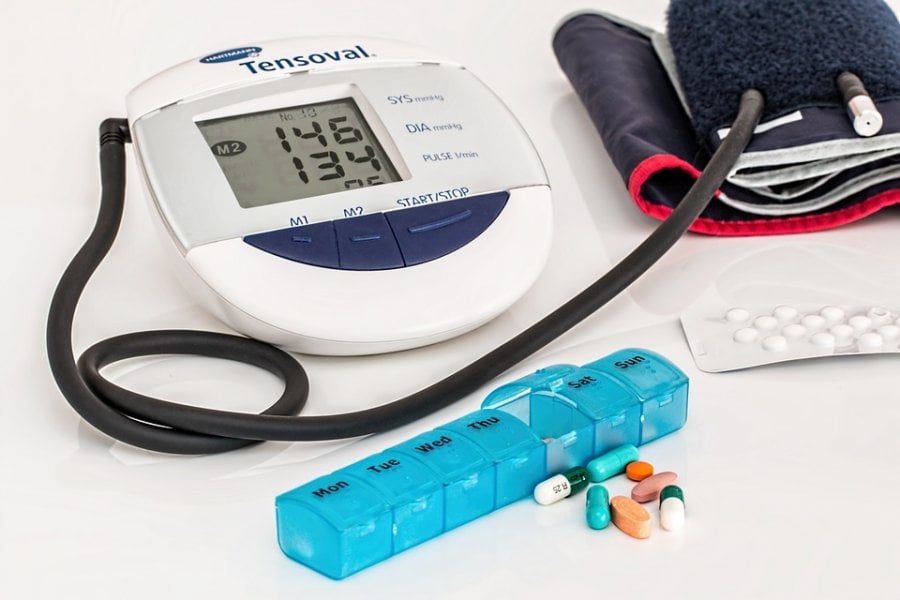Using cardiovascular risk to identify patients eligible for blood pressure treatment could prevent significantly more heart attacks and strokes
25 July 2019 London School of Hygiene & Tropical Medicine London School of Hygiene & Tropical Medicine https://lshtm.ac.uk/themes/custom/lshtm/images/lshtm-logo-black.png
Changing how blood pressure drugs are prescribed could prevent one third more heart attacks and strokes in the UK compared to current recommendations, according to new research published in The Lancet.
Led by the London School of Hygiene & Tropical Medicine (LSHTM) and funded by the National Institute for Health Research, the research estimates that offering treatment based on a patient’s overall cardiovascular risk, rather than their blood pressure, could prevent an additional 85,000 cardiovascular disease (CVD) events over 10 years.
Patients with high blood pressure or other cardiovascular risk factors are at increased risk of experiencing cardiovascular events, such as heart attacks and strokes.
In the UK, there are nearly 1.5 million such CVD events each year. There is evidence that blood pressure lowering drugs can reduce a person’s risk of experiencing a cardiovascular event, even if their initial blood pressure is not classed as high.
Using anonymised records from UK general practice, the team gathered data from 1.2 million patients, aged 30-79 years, without CVD. Using these data the team assessed and compared four possible strategies for blood pressure treatment: the 2011 National Institute for Health and Care Excellence (NICE) guidelines (currently recommended), proposed 2019 NICE guidelines, using blood pressure alone and using predicted 10 year CVD risk alone.
For each strategy, the researchers estimated the proportion of patients eligible for treatment and the number of CVD events that could be prevented with treatment. Eligibility and the number of CVD events that would occur during 10 years in the UK general population were also estimated.
Under current NICE guidelines, the team found that 6.5 million people would be eligible for treatment and 233,152 CVD events could be avoided if all were treated for 10 years.
If a treatment approach based on blood pressure alone was used, 11.6 million people would be eligible for treatment, with 301,523 CVD events avoided.
Proposed NICE guidelines for 2019, which are expected to be published in August 2019, would lead to treatment eligibility for 7.9 million people and 270,233 events could be avoided.
But the most successful strategy appeared to be treating blood pressure based on a patient’s overall 10 year CVD risk: this would qualify 8.6 million patients for treatment, but could avoid the most CVD events, at 322,921.
Dr Emily Herrett, lead author and Assistant Professor at LSHTM, said: “Blood pressure is just one component of absolute cardiovascular risk. The current strategy treats only people with high blood pressure, but that means many people who might benefit from blood pressure lowering treatment are missing out, whereas others might be treated unnecessarily.
“Under any blood pressure lowering strategy, when a patient is identified as eligible for treatment, the first steps should always explore whether lifestyle changes could reduce blood pressure or risk. It’s important to remember that drugs are not a silver bullet.
“Our findings suggest that there is a need to reassess current treatment guidelines: a strategy of treating blood pressure based on overall cardiovascular risk prevented the most heart attacks and strokes and minimised the proportion of people treated without benefit.”
The authors acknowledge limitations of the study, including that they have not yet investigated the potential harms of a change in blood pressure treatment eligibility. In addition, the research has assumed the treatment benefit from blood pressure lowering drugs is achieved across the blood pressure spectrum, where there is currently some conflicting evidence.
Publication
Emily Herrett, Sarah Gadd, Rod Jackson, Krishnan Bhaskaran, Elizabeth Williamson, Tjeerd van Staa, Reecha Sofat, Adam Timmis, Liam Smeeth. Eligibility and subsequent burden of cardiovascular disease of four strategies for blood pressure-lowering treatment: a retrospective cohort study. The Lancet. DOI: 10.1016/S0140-6736(19)31359-5
Our postgraduate taught courses provide health practitioners, clinicians, policy-makers, scientists and recent graduates with a world-class qualification in public and global health.
If you are coming to LSHTM to study a distance learning programme (PG Cert, PG Dip, MSc or individual modules) starting in 2024, you may be eligible for a 5% discount on your tuition fees.
These fee reduction schemes are available for a limited time only.